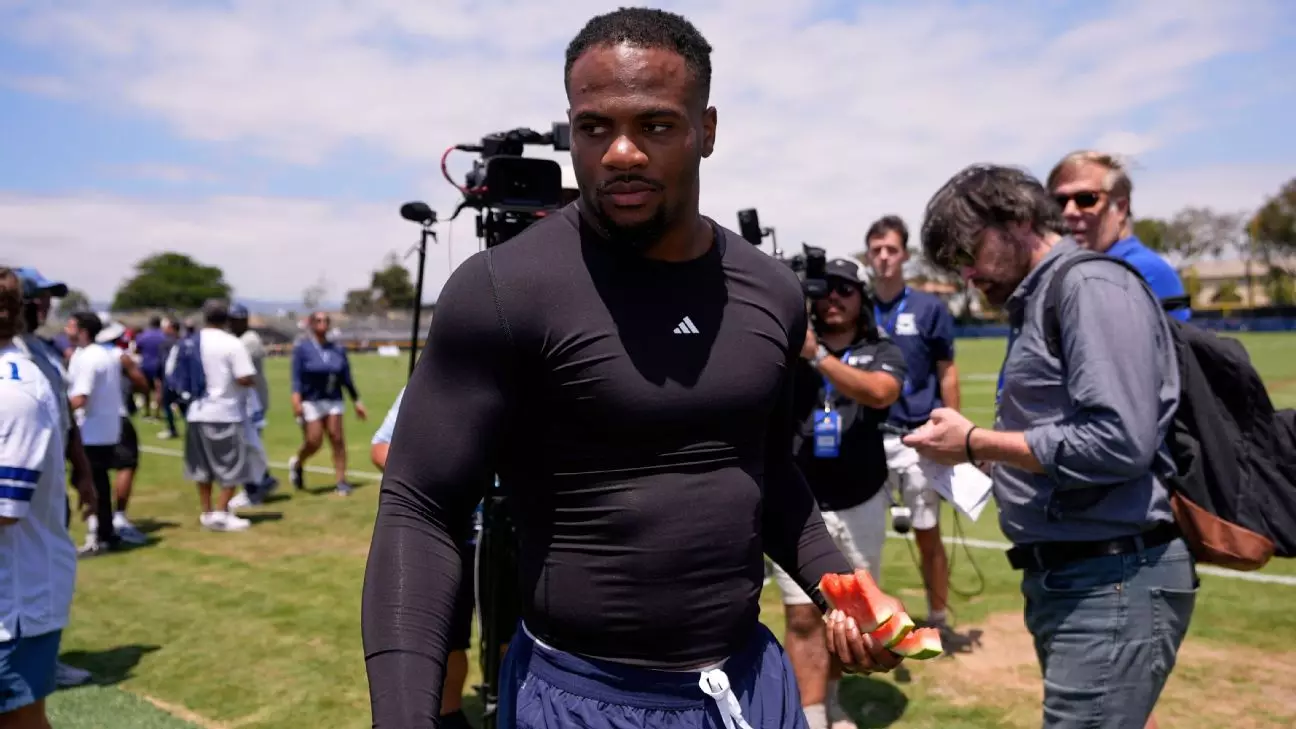In the high-stakes world of NFL negotiations, few scenarios are as scrutinized as superstar players without finalized contracts ahead of the season opener. The Dallas Cowboys find themselves in such a predicament with Micah Parsons, their standout edge rusher. Despite the lingering contract negotiations and the player’s cautious approach during training camp, the coaching staff exudes unwavering confidence that Parsons will be a key contributor when the Cowboys face the Philadelphia Eagles on September 4. This steadfast belief underscores an essential truth in professional football: talent and impact on the field often transcend contractual negotiations, at least in the eyes of those who see beyond the immediate hurdles.
The fact that Parsons remains unsigned beyond his existing rookie deal deadline is a testament to the complexities that come with star negotiations. Yet, head coach Brian Schottenheimer’s optimistic assurances reveal a strategic understanding—Parsons’s presence is so vital that they are willing to bet on his availability, even in the absence of a new contract. That trust reflects not only Parsons’s proven ability to dominate on the field but also his professionalism and commitment, which have earned him leeway even amidst contractual uncertainty.
Injury Management and Readiness Amid Limited Practice
While Parsons’s on-field practices have been limited — participating only in walkthroughs and team meetings — the coaching staff’s confidence hinges on his self-awareness and dedication. Parsons disclosed experiencing back tightness early in camp, leading to targeted treatment and a reduction in high-impact drills. This cautious approach highlights the broader challenge teams face when superstar players are eased into regular practice routines, especially those with injury histories or specific physical maintenance needs.
Schottenheimer emphasizes that Parsons’s proactive management and physical self-awareness are crucial advantages. The player’s ability to handle his body and tailor his participation aims to mitigate risks, especially since football demands high-intensity change-of-direction movement that cannot be adequately replicated during non-contact phases. This dynamic underscores the importance of player-coach communication and the reliance on a player’s self-knowledge, which is now more vital than ever as teams streamline their final roster decisions.
The coaching staff’s belief that Parsons, despite less on-field work, remains a formidable pass rusher hinges on his physical stewardship and mental preparation. This approach, though unorthodox by traditional standards, reflects a nuanced understanding of modern athlete management—one where holistic health, mental readiness, and partial physical participation can suffice, especially when you possess elite talent.
The Strategic Implications for the Cowboys’ Roster and Season Outlook
Beyond individual health and negotiations, Parsons’s situation influences the Cowboys’ broader roster construction strategies. With the final 53-man roster looming, team decision-makers grapple with balancing the need for proven pass rushers versus the risks associated with a physically tentative player. Schottenheimer’s acknowledgment that Parsons’s availability will influence roster decisions, including possibly retaining an extra pass rusher, reveals how intertwined individual player status is with team composition.
In essence, this situation exemplifies a fundamental truth in championship-caliber teams: having a superstar like Parsons provides flexibility and leverage. His proven impact means that even with limited practice, his presence on game day can significantly shift the defensive dynamic. Such confidence stems from Parsons’s track record of game-changing plays and his reputation as a game wrecker, traits that make him indispensable regardless of contractual nuances or preseason routines.
Moreover, the Cowboys’ willingness to prioritize Parsons’s potential over traditional practice requirements indicates a strategic commitment to talent over protocol. While caution is prudent, it also signals an understanding that elite players can often bridge the gap between limited preparation and peak performance—provided their health is managed meticulously. This mindset not only benefits the Cowboys but sets a precedent in how NFL teams might approach star athletes amid demanding schedules and physical tolls.
In conclusion, the Cowboys’ belief in Micah Parsons reveals a deeper philosophy about talent, injury management, and team resilience. His situation illuminates how modern football increasingly values trust, player autonomy, and strategic flexibility. As they prepare for a pivotal season, the ultimate test will be whether this confidence translates into consistent dominance—especially when those initial game days arrive, and Parsons’s absence or limited practice could become a defining factor. But until then, the Cowboys remain unwavering in their conviction: Parsons’s greatness will shine through, contract negotiations or not.


Leave a Reply